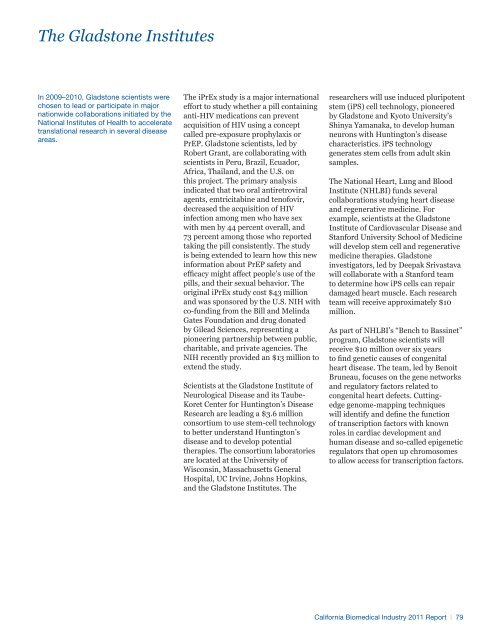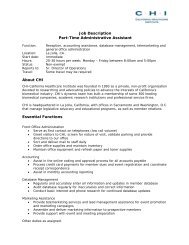The Scripps Research <strong>Institute</strong> (TSRI)Scripps Research scientists have lednumerous seminal studies. To highlightonly a few, over the last decades theinstitute’s investigators have madedozens of breakthroughs:••Malaria, discovering a promisingnew drug candidate that representsa new class of drug to treat thewidespread tropical disease, whichkills nearly 1 million people a year.Clinical trials for the drug candidateare planned. (Winzeler lab, 2010)••“Swine flu,” solving the structureof a key protein from the virus thatcaused the recent H1N1 influenzaepidemic. The structure revealsthat the virus shares many featureswith influenza viruses commonin the early 20th century, helpingto explain why, in general, olderindividuals have been less severelyaffected by the recent outbreak thanyounger ones. (Wilson lab, 2010)••Obesity, showing for the first timethat the same molecular mechanismsthat drive people into drug addictionare behind the compulsion to overeat(Kenny lab, 2010).••HIV/AIDS, elucidating thestructure of a number of humanantibodies that neutralize manydifferent strains of the virus — workthat may one day contribute to anHIV vaccine. (Wilson, Burton labs(with Ollmann Saphire), 2001 –2010).••Mad cow disease, determiningfor the first time that prions, bitsof infectious protein devoid ofDNA or RNA that can cause fatalneurodegenerative disease, arecapable of Darwinian evolution.(Weissmann lab, 2009)••Regenerative medicine,reporting a breakthrough in whichscientists successfully created livemice from mouse skin cells, withoutusing embryonic stem cells orcloning techniques that require eggs.This milestone opens the door to thedevelopment of exciting therapies,such as using a patient’s own cells togrow replacement organs. (Baldwinlab, 2009)••Deafness, elucidating the actionof a protein, harmonin, which isinvolved in the mechanics of hearing.Defects in such genes can causedevastating diseases, such as Usher’ssyndrome, which is characterizedby deafness, gradual vision loss, andkidney disease. (Mueller lab, 2009)••Huntington’s disease, developingan agent that reversed Huntington’sdisease symptoms in mice, withminimal toxicity. (Thomas,Gottesfeld labs, 2008)••Addiction, providing evidence thatthe drug gabapentin affects certaincomponents of the alcohol addictioncycle in the brain, supporting theidea that the medication, which isapproved by the FDA for treatingseizures and pain, also holdspotential for the treatment of alcoholdependence. (Roberto, Koob, Sigginslabs, 2008)••Blindness, achieving completeinhibition of new blood vesselgrowth in animal models ofneovascular eye diseases and avascular brain tumor with little or noeffect on normal tissue. (Friedlanderlab, 2007)••A large class of medicallyrelevant compounds known as Gprotein-coupled receptors (GPCR),determining the first humanstructure of this type of receptor,called β2-adrenergic GPCR. Sciencemagazine named the work as one ofthe top 10 breakthroughs of the year.(Stevens lab, 2007)••Amyloid disease, developingthe first disease-modifying agenttargeting the underlying cause of thistype of disorder, a class that includesAlzheimer’s disease. A drug based onthis finding (tafamidis by FoldRX,a company to be acquired by Pfizer,Inc.) is currently undergoing clinicaltrials for a type of inherited diseaseknown as Transthyretin amyloidosis.(Kelly lab, 2003)• • Cancer drug synthesis,completing the total synthesis of theanti-cancer drug Taxol, approved bythe FDA for the treatment of ovariancancer. Before the synthesis, Taxol,whose active compound was firstisolated from the bark of the rarePacific yew, demonstrated greatpromise as a cancer treatment, butits full impact was prevented by theproblem that treating one patientrequired the destruction of morethan three of these precious trees.Another example of a remarkablefeat of synthesis includes developingan inexpensive and in many waysastonishing new method foreconomically synthesizing cortistatinA. This steroid, which was isolatedin 2006 from a marine spongediscovered over 100 years ago, hasshown huge promise for treatingconditions ranging from maculardegeneration to cancer. (Taxol,Nicholaou lab, 1994; cortistatin A,Baran lab, 2008)78 | <strong>California</strong> <strong>Biomedical</strong> <strong>Industry</strong> 2011 Report
The Gladstone <strong>Institute</strong>sIn 2009–2010, Gladstone scientists werechosen to lead or participate in majornationwide collaborations initiated by theNational <strong>Institute</strong>s of Health to acceleratetranslational research in several diseaseareas.The iPrEx study is a major internationaleffort to study whether a pill containinganti-HIV medications can preventacquisition of HIV using a conceptcalled pre-exposure prophylaxis orPrEP. Gladstone scientists, led byRobert Grant, are collaborating withscientists in Peru, Brazil, Ecuador,Africa, Thailand, and the U.S. onthis project. The primary analysisindicated that two oral antiretroviralagents, emtricitabine and tenofovir,decreased the acquisition of HIVinfection among men who have sexwith men by 44 percent overall, and73 percent among those who reportedtaking the pill consistently. The studyis being extended to learn how this newinformation about PrEP safety andefficacy might affect people’s use of thepills, and their sexual behavior. Theoriginal iPrEx study cost $43 millionand was sponsored by the U.S. NIH withco-funding from the Bill and MelindaGates Foundation and drug donatedby Gilead Sciences, representing apioneering partnership between public,charitable, and private agencies. TheNIH recently provided an $13 million toextend the study.Scientists at the Gladstone <strong>Institute</strong> ofNeurological Disease and its Taube-Koret Center for Huntington’s DiseaseResearch are leading a $3.6 millionconsortium to use stem-cell technologyto better understand Huntington’sdisease and to develop potentialtherapies. The consortium laboratoriesare located at the University ofWisconsin, Massachusetts GeneralHospital, UC Irvine, Johns Hopkins,and the Gladstone <strong>Institute</strong>s. Theresearchers will use induced pluripotentstem (iPS) cell technology, pioneeredby Gladstone and Kyoto University’sShinya Yamanaka, to develop humanneurons with Huntington’s diseasecharacteristics. iPS technologygenerates stem cells from adult skinsamples.The National Heart, Lung and Blood<strong>Institute</strong> (NHLBI) funds severalcollaborations studying heart diseaseand regenerative medicine. Forexample, scientists at the Gladstone<strong>Institute</strong> of Cardiovascular Disease andStanford University School of Medicinewill develop stem cell and regenerativemedicine therapies. Gladstoneinvestigators, led by Deepak Srivastavawill collaborate with a Stanford teamto determine how iPS cells can repairdamaged heart muscle. Each researchteam will receive approximately $10million.As part of NHLBI’s “Bench to Bassinet”program, Gladstone scientists willreceive $10 million over six yearsto find genetic causes of congenitalheart disease. The team, led by BenoitBruneau, focuses on the gene networksand regulatory factors related tocongenital heart defects. Cuttingedgegenome-mapping techniqueswill identify and define the functionof transcription factors with knownroles in cardiac development andhuman disease and so-called epigeneticregulators that open up chromosomesto allow access for transcription factors.<strong>California</strong> <strong>Biomedical</strong> <strong>Industry</strong> 2011 Report | 79






